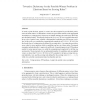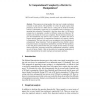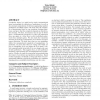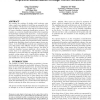205 search results - page 4 / 41 » Elections Can be Manipulated Often |
109
click to vote
JCSS
2010
14 years 9 months ago
2010
To make a joint decision, agents (or voters) are often required to provide their preferences as linear orders. To determine a winner, the given linear orders can be aggregated acc...
107
click to vote
CLIMA
2010
14 years 11 months ago
2010
When agents are acting together, they may need a simple mechanism to decide on joint actions. One possibility is to have the agents express their preferences in the form of a ballo...
CORR
2012
Springer
13 years 6 months ago
2012
Springer
All previous work on “candidate-control” manipulation of elections has been in the model of full-information, simultaneous voting. This is a problem, since in quite a few real...
ATAL
2008
Springer
15 years 29 days ago
2008
Springer
Complexity theory is a useful tool to study computational issues surrounding the elicitation of preferences, as well as the strategic manipulation of elections aggregating togethe...
DAS
2010
Springer
15 years 2 months ago
2010
Springer
We consider the problem of dealing with irrelevant votes when a multi-case classifier is built from an ensemble of binary classifiers. We show how run-off elections can be used to...




